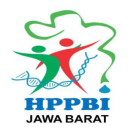The Efforts to Improve Students' Digital Literacy using Flipbook-Based E-Modules on Biodiversity Topic
DOI:
https://doi.org/10.37150/rebion.v4i2.2307Abstract
Background: This classroom action research was motivated by the low digital literacy skills of students due to the lack of effective and quality literacy resources in schools. The aim of this research is an effort to increase students' digital literacy through the use of flipbook-based Biodiversity e-modules. Methods: This research applies the collaborative PTK method based on lesson study. This research was carried out in class X8 of SMA Negeri 9 Bogor City with 36 students. The instruments used were a digital literacy questionnaire and student response questionnaire, as well as a teacher interview format. Results: The average score obtained in Cycle I was 72.45 which increased to 81.67 in Cycle II, with the percentage of students' digital literacy skills in Cycle II being 83% of the total number of students with Very Good criteria. The average emergence of digital literacy skills in each indicator in Cycle I was in the good criteria (60 - 80) and in Cycle II there was an increase with the average showing very good criteria (81 - 100). The results of the student response questionnaire obtained scores ranging from 81 - 100 in the very good category which is in line with the positive response from teachers regarding the use of the flipbook-based Biodiversity e-module.. Conclusion: The results of all the instruments used show that there is an increase in students' digital literacy skills through the use of flipbook-based Biodiversity e-modules.
Keywords : E-module; flipbook; biodiversity; digital literacy
Downloads
Published
How to Cite
Issue
Section
License
Copyright (c) 2023 Report of Biological Education

This work is licensed under a Creative Commons Attribution-NonCommercial-ShareAlike 4.0 International License.










